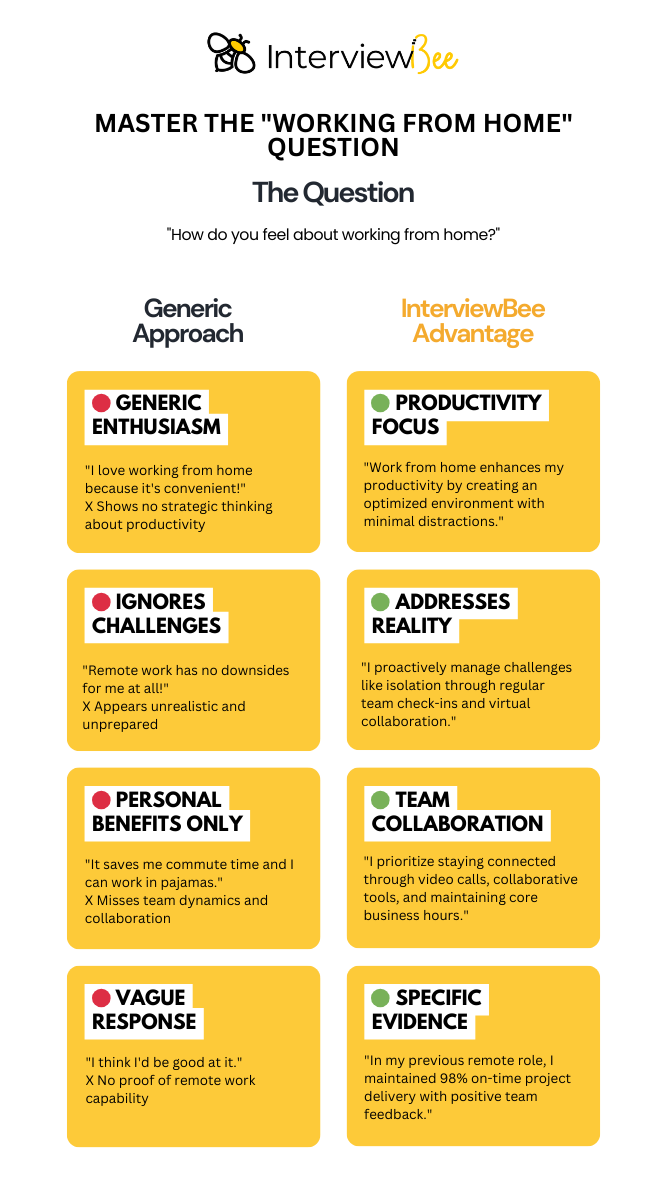
How to Answer "How Do You Feel About Working From Home?" - The Question That Tests More Than You Think (2025)
- Author: Anindita Ghosh
- Published On: Aug 17, 2025
- Category:Interview Guide
Remote work is no longer optional; it's essential. With 73% of teams including remote workers by 2025, the question "How do you feel about working from home?" has become a critical interview assessment. This question is among the most common remote work interview questions that candidates face. Yet most candidates treat work from home discussions as simple preference questions, missing the deeper evaluation happening beneath the surface.
Why Interviewers Really Ask This Question
This isn't about your work location preference. Like other strategic remote work interview questions, interviewers use this to assess:
- Self-management skills: Can you maintain productivity without supervision?
- Communication abilities: How do you stay connected with distributed teams?
- Adaptability: Are you comfortable with technology and changing work dynamics?
- Cultural fit: Do your work from home values align with company expectations?
What the Majority of Candidates Do Wrong
The biggest mistakes reveal themselves immediately:
- Generic Enthusiasm: Did you say you love working at home because it is convenient? This simmering disposition does not reflect on any strategy of staying productive or advancing the profession.
- Negating Problems: The aspirants that promote the idea of work-at-home and deny that it causes any negative outcomes seem impractical and not to be ready to a real work from home requirements.
- Lack of Team Dynamics: Paying attention to the individual gains and not carrying out any efficient measures procuring in collaboration, communication, or cohesiveness within the team.
The Framework That Wins Remote Offers
Successful candidates organise their answer following the method of PACE:
Productivity Focus (30 seconds): "Work from home conditions increase my productivity since it enables me to set up an optimized work program with few distractions. I have realized that I have been able to produce a better work as far as I am able to manage my working place."
Adaptability Practice (30 seconds): "I have established a robust remote working practices such as allocating a specific workspace, planning day-to-day activities, and being active in communications with other team members working in different time zones."
Collaboration Commitment (30 seconds): "I make it a priority to maintain contact regularly via video check-ins and collaborative technology and by ensuring I am available during core business hours. I too pay the extra miles by fostering relationship via virtual coffee hours and team engagements."
Excellence Evidence (30 seconds): "I had a history of working in a remote position in my past and was able to keep project delivery within 98 percent on schedule and had positive feedback in areas of communication, and project team-building. I realize that working remotely takes deliberate effort in ensuring that a team can stay together."

How InterviewBee Elevates Your Remote Work Response
When facing this and other challenging remote work interview questions, InterviewBee provides instant structure and talking points:
- Real-Time Framework Prompts: The moment you hear this question, InterviewBee suggests: "Start with productivity benefits, then address collaboration strategies, and conclude with specific examples."
- Role-Specific Guidance: For different positions, it adapts your work from home response, suggesting project management tools for operations roles or creative collaboration methods for design positions.
- Avoiding Common Pitfalls: InterviewBee reminds you to address potential challenges proactively, demonstrating a mature understanding of remote work realities.
An Easy Way to Prepare Master Remote Work Questions
The remote work question is here to stay and it is growing more advanced as organizations perfect their distributed work approach. By being well prepared and having the real-time backup, you can show that it is not the case that you are comfortable with remote work, but that you are ready and prepared to succeed in it head and shoulders above the others.
Excited to rock your next virtual employment test? Try InterviewBee for free and make job flexibility questions look like powerful examples how mature you are in your profession.


